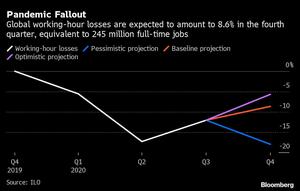 In this June 15, 2020 file photo, commuters wearing face masks walk through the concourse at Waterloo Station in London after new rules make wearing face coverings on public transport compulsory while the UK further eases its coronavirus lockdown. (NIKLAS HALLE'N / AFP)
In this June 15, 2020 file photo, commuters wearing face masks walk through the concourse at Waterloo Station in London after new rules make wearing face coverings on public transport compulsory while the UK further eases its coronavirus lockdown. (NIKLAS HALLE'N / AFP)
GENEVA - The damage to labor markets from the coronavirus is proving worse than anticipated, according to the International Labour Organization (ILO), which also sees a much slower recovery at the end of this year.
The ILO said that global working hour losses so far this year have been “considerably larger” than previously estimated. In the second quarter, working hours were 17 percent lower compared with the end of 2019, equivalent to almost 500 million jobs. That’s up from 400 million projected in June.
The organization also estimates that labor income losses around the world -- excluding the offset from government support programs -- amounted to US$3.5 trillion so far
The organization also estimates that labor income losses around the world amounted to US$3.5 trillion so far.
The figure, which does not include income support provided by governments to compensate for workplace closures during the pandemic, is equal to 5.5 percent of global gross domestic product (GDP) for the first three quarters of 2019, it said.
ALSO READ: Africa and Asia to face migrant crisis amid pandemic, ILO warns
Workers in developing and emerging economies, especially those in informal employment, had been affected to a much greater extent than in past crises, the United Nations agency said. It added that a decline in employment numbers had generally been greater for women than men.
“Just as we need to redouble our efforts to beat the virus, so we need to act urgently and at scale to overcome its economic, social and employment impacts. That includes sustaining support for jobs, businesses and incomes,” ILO Director-General Guy Ryder said in a statement.

In the second quarter alone, the revised estimate of global working time lost was 17.3 percent, equivalent to 495 million full-time jobs, against a previous estimate of 14 percent or 400 million jobs, the report said.
In the third quarter, working-hour losses of 12.1 percent or equivalent to 345 million jobs were expected, it said.
“Moreover, revised projections for the fourth quarter suggest a bleaker outlook than previously estimated,” it said.
READ MORE: ILO warns of uncertain job market
Working hours losses in the final quarter of 2020 are now projected to amount to 8.6 percent, equivalent to 245 million full-time jobs, against the same time a year ago, the ILO said. Under a pessimistic outcome, the fallout could amount to the equivalent of more than 500 million.
The revisions partly reflect the increase in global infection rates, which means a greater economic impact in the second half than the ILO previously assumed. The Geneva-based organization also said there’s been greater damage to jobs in developing economies, where there’s less opportunity for home working, and on informal work.
Worryingly for the long term, the ILO said the decline in employment has led to an increase in inactivity. That could leave many people cut off from the labor market, slow the job recovery and increase inequality.
ALSO READ: ILO: Pandemic plunges working world into crisis
With inputs from Reuters


